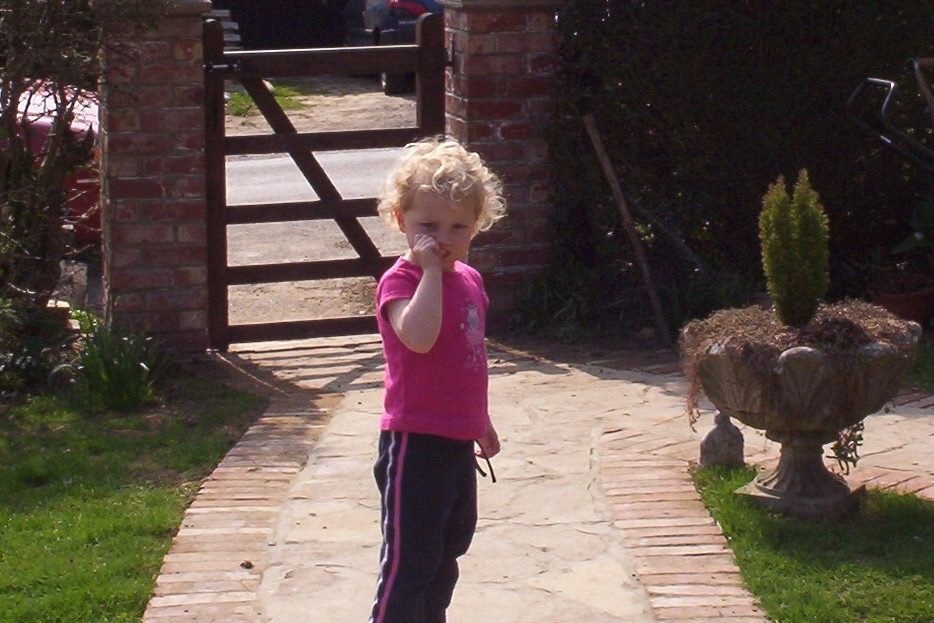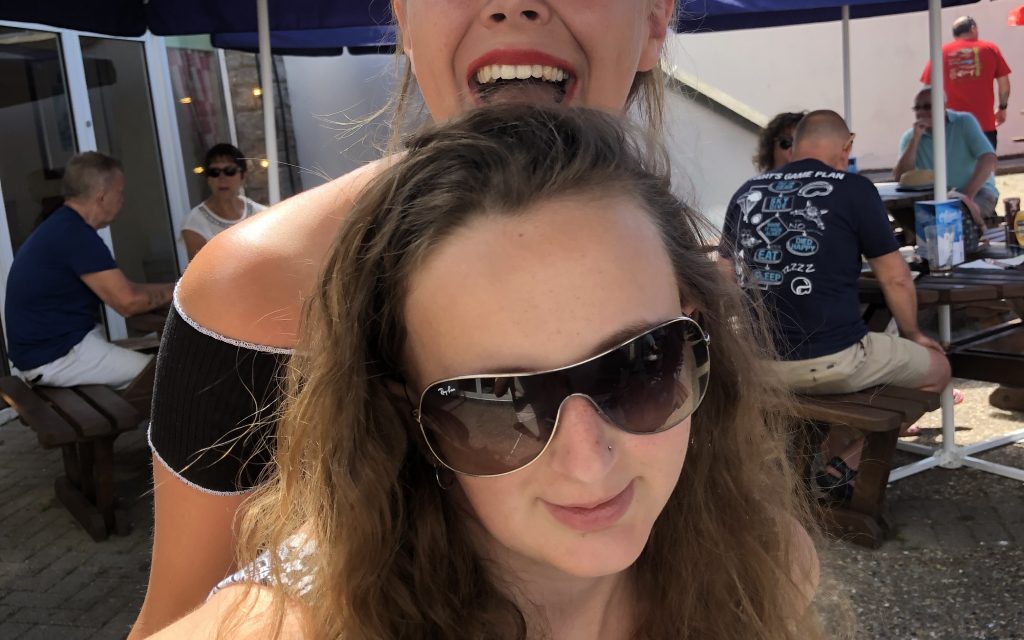A teenager whose parents were told to take their ailing daughter home and wait for ‘the big one’ has revealed how they refused to give up on her life – and began researching treatments that would eventually vastly improve her condition.
Izzy Colville, now 18, from West Sussex, was diagnosed with a rare inoperable tumour attached to her brain and right eye socket, nose and jaw at the age of just four.
The little girl endured high dose radiotherapy every day for six weeks and ten cycles of chemotherapy over a year. While radiotherapy shrunk her tumour, it left her blind in her right eye, partially sighted in her left and deaf in her right ear.
When she was 11, a series of strokes left doctors fearing Izzy wouldn’t make it and her parents were told to take her home to wait for a fatal stroke, which they dubbed ‘the big one’.
Her devastated parents, Paul and Sarah, refused to accept there was no chance for their little girl, and after hours of research online they discovered she could be helped by surgery to create new pathways for blood flow to the brain.
Now, at 18, Izzy is full of hope for the future – studying for GCSEs in maths and English and hoping to go to college to study a health and beauty course. And Izzy has now become a Young Ambassador with The Brain Tumour Charity to help raise awareness.
“My parents were devastated when they were told to take me home and wait for the ‘big one,’ after I had my stroke,” said Izzy from West Sussex.
“If they’d listened, I probably wouldn’t be here now. But overall, I have had brilliant treatment and support from the NHS and charities – so now I want to make the most of every minute and give something back to other young people.”

“Dad had a gut feeling straight away that it was something serious,”
When Izzy was four, Paul, 50, noticed a slight swelling under her right eye.
“He took me to a GP, who said it was a blockage in my glands and prescribed antibiotics,” said Izzy.
By the end of the week, Izzy’s eye was protruding. Worried Paul took her to A&E at Royal Surrey Hospital, where scans showed a tennis ball-sized tumour.
A six-hour biopsy at St George’s Hospital, London, revealed Izzy had a rare stage three (cancerous) orbital rhabdomyosarcoma, which develops in the muscles, usually the head and neck. Only about 300 people a year are diagnosed with this type of tumour and she was given a 30 per cent chance of survival.
The tumour was inoperable due to its position so Izzy was referred To the Royal Marsden Hospital in London for radiotherapy and chemotherapy.
Izzy and her family were in and out of hospital for a year and she coped ‘brilliantly.’ But her parents were ‘in pieces’ watching their daughter go through such harsh treatment and ‘wished it could have been one of them.’ Her diagnosis had a devastating impact on the whole family.
“For three months, I was in shock. I was grieving for my daughter – the person I thought she’d be,” said Paul. “But then I eventually accepted the ‘new’ her. Most of all, I was grateful we still had her – she was still here and each day was a gift.
“I cherished her each and every single day – and still do.”

“It was tough on Molly, too.”
Family life was also put on hold for Izzy’s big sister, Molly, now 22, who was eight when Izzy was diagnosed.
“People too often forget about the impact on siblings when a child is ill,” said Izzy.
“It was tough on Molly, too.
“She’d be tucked up in bed at home and then wake up at my gran’s in the morning because Mum and Dad had had to take me to hospital.
“Her life was turned upside down when she was too young to really understand.”
The family was thrilled when Izzy was discharged from hospital in June 2005, but it took a while to adjust to life outside their ‘safe bubble.’ A few months after Izzy’s treatment finished, Sarah, 54, had a break down.
“Everything suddenly hit me like a ton of bricks. After Izzy’s diagnosis, I was on automatic pilot and being strong for everyone – when she was better, I fell apart. Now it was Paul’s turn to keep everything going while I struggled.”
For eight months, Sarah was so depressed she couldn’t get out of bed.
“I thought that if I didn’t wake up, I wouldn’t have to face the possibility of anything happening again to Izzy,” said Sarah.
She was diagnosed with post-traumatic stress syndrome, had cognitive behavioural therapy (CBT) and was put on antidepressants.
Izzy missed all her reception year of school and was home schooled for most of Year 1. She went to primary school in Year 2 but as brain damage from radiotherapy had left her with severe learning difficulties, between 8-17, she went to a Stepping Stones School, which focuses on helping children with disabilities.
Just as the family had pieced their lives back together, Izzy suffered a stroke in 2011 at the age of 11.
“I was in my gran’s car with Molly, when suddenly I just couldn’t get my words out,” she said. “It felt like my tongue was swollen to twice its size and I couldn’t speak.
“I was frightened as I didn’t know what was happening to me and I started trying to hit Gran to get her attention. But she told me off as she thought I was just messing around while she was driving.
“When we got out of the car at the shopping centre, my legs gave away beneath me and I toppled on to Molly.”
Scans revealed Izzy had suffered a stroke. She was diagnosed with Moya Moya Disease and doctors said she’d also had a series of Transient Ischaemic Attack (TIAs), mini strokes.
“A doctor told my parents that nothing could be done for me,” said Izzy. “They were told to take me home and wait for another stroke – the ‘big one.’
“But my mum said, ‘I’m not having that.” How can any parent accept they’ve been told to take their daughter home and wait for something that could kill her?” said Izzy.
Paul and Sarah spent hours researching online and the NHS funded Izzy’s surgery to create new pathways for blood flow to the brain.

“A doctor told my parents that nothing could be done for me,”
The eight-hour operation at Great Ormond Street Hospital in London was a success and now Izzy only has TIAS varying from three a week to one a month, compared to two-three major strokes a month before the operation.
Izzy has had more than 40 operations with the most recent one in May when bone in her jaw destroyed by cancer was replaced with bone from her hip – and she faces more surgery in the future.
Now Izzy is one of The Brain Tumour Charity’s 23 Young Ambassadors across the UK helping to raise awareness and offer support to other young people facing similar struggles, working closely with the charity’s Young Adults Service.
She is volunteering at the charity’s Windsor Twilight Walk on October 6 – although the 10km walk is too much for her, she wants to be part of the day and support others.
“Living with my diagnosis and treatment has made me feel isolated and alone at times,’ said Izzy who loves horse riding, singing and gardening.
“I still feel different and left out sometimes when I see my sister and friends learning to drive, going to parties and on dates. I have to be careful at parties if I drink alcohol as then I have to adjust my medication – I can’t be carefree like them.
“But I’m in a much better place now and being a Young Ambassador is important to me as I want to support other young people as I get what they’re going through.
“Not like some adults who tell you everything’s going to be OK when often they don’t really understand the first thing about your feelings.
“I want to use my position with The Brain Tumour Charity to give something back.
“Now I count my blessings and feel hopeful for the future.”
Sarah Lindsell, The Brain Tumour Charity’s chief executive, said: “We are thrilled to have Izzy as one of our Young Ambassadors and are so grateful for her support.
“The programme is now in its third year – each and every one of our Young Ambassadors is an inspiration and play a vital part in helping us to raise awareness and offer support.“
Interview: Carol Dyce. Originally published on The Daily Mail
